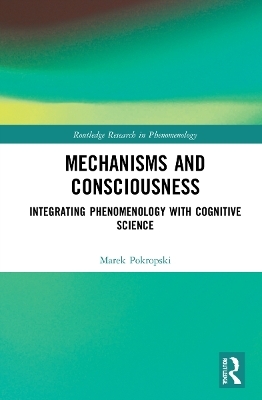
Mechanisms and Consciousness
Integrating Phenomenology with Cognitive Science
Seiten
2023
Routledge (Verlag)
978-1-032-13792-6 (ISBN)
Routledge (Verlag)
978-1-032-13792-6 (ISBN)
This book develops a new approach to naturalizing phenomenology. The author proposes a mechanistic model that offers new methodological perspectives for studying complex mental phenomena such as consciousness.
This book develops a new approach to naturalizing phenomenology. The author proposes to integrate phenomenology with the mechanistic framework that offers new methodological perspectives for studying complex mental phenomena such as consciousness.
While mechanistic explanatory models are widely applied in cognitive science, their approach to describing subjective phenomena is limited. The author argues that phenomenology can fill this gap. He proposes two novel ways of integrating phenomenology and mechanism. First, he presents a new reading of phenomenological analyses as functional analyses. Such functional phenomenology delivers a functional sketch of a target system and provides constraints on the space of possible mechanisms. Second, he develops the neurophenomenological approach in the direction of dynamic modeling of experience. He shows that neurophenomenology can deliver dynamical constraints on mechanistic models and thus inform the search for an underlying mechanism.
Mechanisms and Consciousness will be of interest to scholars and advanced students working in phenomenology, philosophy of mind, and the cognitive sciences.
This book develops a new approach to naturalizing phenomenology. The author proposes to integrate phenomenology with the mechanistic framework that offers new methodological perspectives for studying complex mental phenomena such as consciousness.
While mechanistic explanatory models are widely applied in cognitive science, their approach to describing subjective phenomena is limited. The author argues that phenomenology can fill this gap. He proposes two novel ways of integrating phenomenology and mechanism. First, he presents a new reading of phenomenological analyses as functional analyses. Such functional phenomenology delivers a functional sketch of a target system and provides constraints on the space of possible mechanisms. Second, he develops the neurophenomenological approach in the direction of dynamic modeling of experience. He shows that neurophenomenology can deliver dynamical constraints on mechanistic models and thus inform the search for an underlying mechanism.
Mechanisms and Consciousness will be of interest to scholars and advanced students working in phenomenology, philosophy of mind, and the cognitive sciences.
Marek Pokropski is Assistant Professor at the Faculty of Philosophy, University of Warsaw, Poland.
Introduction
Part I. Integrating Phenomenology with Cognitive Science
1. The Concept of Phenomenology
2. Naturalizing Phenomenology Reconsidered
3. Models of Explanation in Cognitive Science
Part II. Phenomenology and Mechanism: In Search of Constraints
4. Phenomenology and Functionalism
5. Phenomenology and Dynamical Modeling
6. Conclusion: Towards Methodologically Guided Mutual Constraints
| Erscheinungsdatum | 28.09.2023 |
|---|---|
| Reihe/Serie | Routledge Research in Phenomenology |
| Zusatzinfo | 8 Halftones, black and white; 8 Illustrations, black and white |
| Verlagsort | London |
| Sprache | englisch |
| Maße | 152 x 229 mm |
| Gewicht | 400 g |
| Themenwelt | Geisteswissenschaften ► Philosophie |
| Geisteswissenschaften ► Psychologie ► Allgemeine Psychologie | |
| Geisteswissenschaften ► Psychologie ► Verhaltenstherapie | |
| Naturwissenschaften | |
| ISBN-10 | 1-032-13792-4 / 1032137924 |
| ISBN-13 | 978-1-032-13792-6 / 9781032137926 |
| Zustand | Neuware |
| Informationen gemäß Produktsicherheitsverordnung (GPSR) | |
| Haben Sie eine Frage zum Produkt? |
Mehr entdecken
aus dem Bereich
aus dem Bereich
Techniken der Verhaltenstherapie
Buch (2024)
Julius Beltz GmbH & Co. KG (Verlag)
35,00 €


